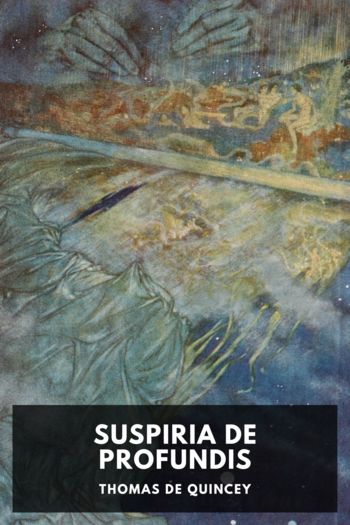Confessions of an English Opium-Eater, Thomas De Quincey [best books for students to read TXT] 📗

- Author: Thomas De Quincey
Book online «Confessions of an English Opium-Eater, Thomas De Quincey [best books for students to read TXT] 📗». Author Thomas De Quincey
Lord of my learning, and no land beside—
were, like my friend Lord ⸻, heir by general repute to £70,000 per annum, what a panic should I be under at this moment about my throat! Indeed, it was not likely that Lord ⸻ should ever be in my situation. But nevertheless, the spirit of the remark remains true—that vast power and possessions make a man shamefully afraid of dying; and I am convinced that many of the most intrepid adventurers, who, by fortunately being poor, enjoy the full use of their natural courage, would, if at the very instant of going into action news were brought to them that they had unexpectedly succeeded to an estate in England of £50,000 a-year, feel their dislike to bullets considerably sharpened,6 and their efforts at perfect equanimity and self-possession proportionably difficult. So true it is, in the language of a wise man whose own experience had made him acquainted with both fortunes, that riches are better fitted
To slacken virtue, and abate her edge,
Than tempt her to do ought may merit praise.
I dally with my subject because, to myself, the remembrance of these times is profoundly interesting. But my reader shall not have any further cause to complain, for I now hasten to its close. In the road between Slough and Eton I fell asleep, and just as the morning began to dawn I was awakened by the voice of a man standing over me and surveying me. I know not what he was: he was an ill-looking fellow, but not therefore of necessity an ill-meaning fellow; or, if he were, I suppose he thought that no person sleeping out-of-doors in winter could be worth robbing. In which conclusion, however, as it regarded myself, I beg to assure him, if he should be among my readers, that he was mistaken. After a slight remark he passed on; and I was not sorry at his disturbance, as it enabled me to pass through Eton before people were generally up. The night had been heavy and lowering, but towards the morning it had changed to a slight frost, and the ground and the trees were now covered with rime. I slipped through Eton unobserved; washed myself, and as far as possible adjusted my dress, at a little public-house in Windsor; and about eight o’clock went down towards Pote’s. On my road I met some junior boys, of whom I made inquiries. An Etonian is always a gentleman; and, in spite of my shabby habiliments, they answered me civilly. My friend Lord ⸻ was gone to the University of ⸻. “Ibi omnis effusus labor!” I had, however, other friends at Eton; but it is not to all that wear that name in prosperity that a man is willing to present himself in distress. On recollecting myself, however, I asked for the Earl of D⸺, to whom (though my acquaintance with him was not so intimate as with some others) I should not have shrunk from presenting myself under any circumstances. He was still at Eton, though I believe on the wing for Cambridge. I called, was received kindly, and asked to breakfast.
Here let me stop for a moment to check my reader from any erroneous conclusions. Because I have had occasion incidentally to speak of various patrician friends, it must not be supposed that I have myself any pretension to rank and high blood. I thank God that I have not. I am the son of a plain English merchant, esteemed during his life for his great integrity, and strongly attached to literary pursuits (indeed, he was himself, anonymously, an author). If he had lived it was expected that he would have been





Comments (0)